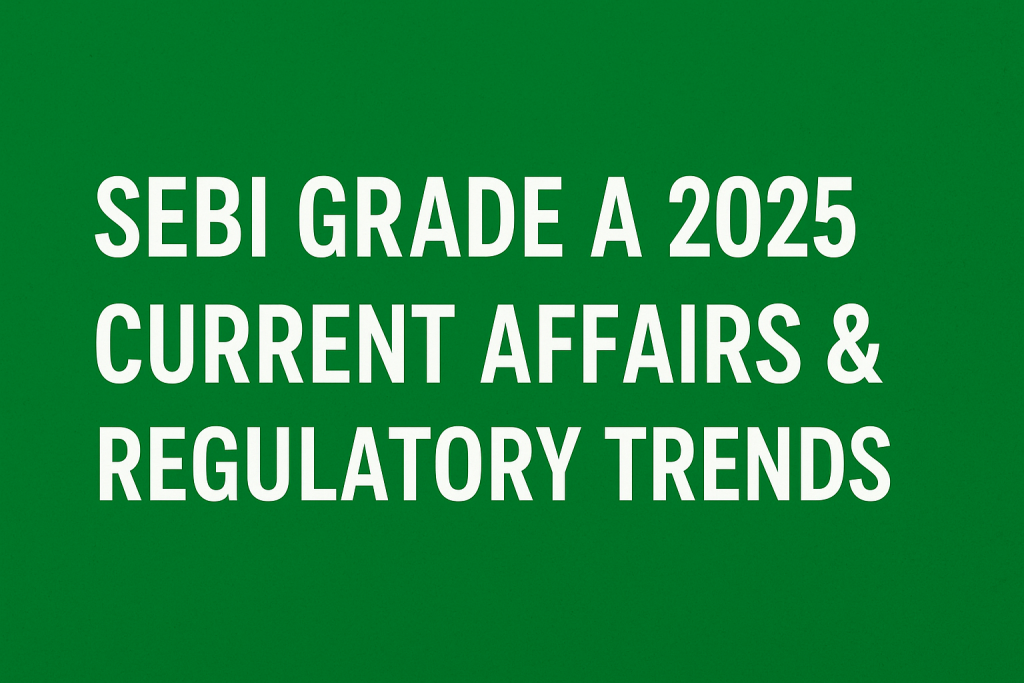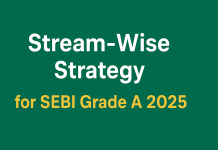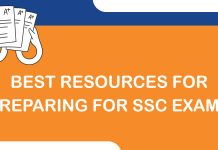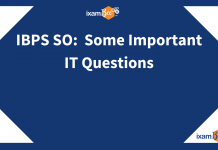The SEBI Grade A exam has always been more than just a test of knowledge — it’s an evaluation of how well candidates understand the pulse of India’s financial system. With the 2025 recruitment cycle around the corner, staying updated with current affairs and regulatory developments is crucial. SEBI expects candidates to be aware of recent reforms, emerging market dynamics, and financial policies that shape India’s economy.
This article takes a closer look at the key current affairs, economic shifts, and regulatory trends likely to influence the SEBI Grade A 2025 exam — helping aspirants prepare with confidence and focus.

SEBI Grade A 2025: Why Current Affairs and Regulatory Awareness Matter
Current affairs form a major part of both the General Awareness and Paper 2 sections of the SEBI Grade A 2025 exam. Questions are designed to assess not only factual knowledge but also a candidate’s understanding of why regulatory decisions matter.
In 2025, SEBI’s focus areas continue to revolve around strengthening financial transparency, improving investor protection, and adapting to technological innovations like AI, fintech, and blockchain. Candidates who can connect these developments to SEBI’s regulatory role stand out in both objective and descriptive papers.
Economic and Financial Developments to Track for SEBI Grade A 2025
Take a look at some of the most important financial and economic developments that are important for your SEBI Grade A 2025 Exam preparation.
Union Budget 2025 Highlights
The Union Budget 2025-2026 is a goldmine for SEBI-related questions. Aspirants should focus on policy announcements affecting capital markets, fiscal deficit targets, tax reforms, and government spending on financial infrastructure. Budget updates on digital economy initiatives, MSME funding, and disinvestment plans often feature in the exam.
Understanding the budget’s implications on market sentiment, FDI flow, and investor confidence can also enhance essay or descriptive answers in Phase II.
Monetary Policy and Inflation Trends
The Reserve Bank of India’s (RBI) monetary policy decisions directly impact market liquidity and bond yields — both relevant to SEBI’s domain. In 2025, inflation control, repo rate adjustments, and the central bank’s stance on digital currencies are expected to be key topics. Candidates should be able to explain how these decisions affect equity and debt markets.
India’s Digital Finance Push
Digital transformation continues to redefine financial regulation. The rise of fintech start-ups, payment banks, and blockchain-based solutions has compelled SEBI and RBI to adapt their frameworks. Keeping track of digital currency developments, UPI expansion, and cybersecurity policies will be essential for SEBI Grade A aspirants.
Global Economic Outlook
Global financial trends, such as interest rate changes by the US Federal Reserve or geopolitical trade shifts, often influence Indian markets. Questions may relate to how global capital flow, crude oil prices, or exchange rate volatility impact domestic investment.
Major Regulatory Developments Expected for SEBI Grade A 2025
Have a close look at some of the most important regulatory developments you can expect to have an importance for the SEBI Grade A 2025.
SEBI’s Strengthened Investor Protection Framework
In recent years, SEBI has prioritized investor awareness, grievance redressal, and transparency in disclosures. The expansion of the SCORES (SEBI Complaints Redress System) portal and new norms for investor education are expected to be major highlights in 2025.
Candidates should study SEBI’s initiatives promoting fair trade practices and their alignment with global investor protection standards.
ESG (Environmental, Social, and Governance) Norms
SEBI has made ESG disclosures mandatory for top listed entities through the Business Responsibility and Sustainability Report (BRSR). With global emphasis on sustainable finance, 2025 may bring further integration of ESG metrics into market compliance frameworks. Aspirants should understand how sustainability reporting impacts corporate governance and investor confidence.
Regulatory Reforms for Mutual Funds and PMS
Mutual fund regulation remains one of SEBI’s most active domains. In 2025, new guidelines related to risk categorization, expense ratios, and investor disclosures are anticipated. Portfolio Management Services (PMS) and Alternative Investment Funds (AIFs) may also face stricter norms to improve accountability.
Understanding how these reforms promote transparency and safeguard investors will be beneficial for Paper 2 preparation.
Fintech and Crypto Oversight
Fintech and cryptocurrency regulation continue to evolve. SEBI and the Ministry of Finance are working to define the scope of oversight on crypto assets, crowdfunding platforms, and algorithmic trading. For SEBI Grade A aspirants, knowing the government’s stance on crypto taxation and blockchain applications in securities trading is essential.
Corporate Governance and Compliance
In 2025, SEBI is likely to strengthen corporate governance mechanisms. Topics like independent director roles, related-party transactions, and disclosure norms are key areas to review. The emphasis is on transparency, timely information dissemination, and accountability in listed companies.
Banking and Financial Sector Reforms to Watch
The Indian financial ecosystem continues to evolve through the introduction of new policy frameworks. Keep an eye on:
- Public Sector Bank consolidation: Its impact on credit flow and capital adequacy.
- NBFC regulation updates, particularly regarding lending practices and asset quality standards.
- Digital lending guidelines: Jointly issued by SEBI, RBI, and the Ministry of Electronics & IT.
- Green finance initiatives: New instruments like green bonds are gaining traction.
Each of these reforms reflects SEBI’s broader regulatory philosophy — ensuring stability and innovation in equal measure.
Expected Focus Areas for SEBI Grade A 2025 Current Affairs Section
While the SEBI Grade A exam pattern & syllabus remain stable, the focus shifts every year with economic trends. For SEBI Grade A 2025, candidates should expect questions around:
- Union Budget & Economic Survey 2025
- Latest SEBI circulars and press releases
- Global market updates and trade agreements
- Corporate governance and insider trading norms
- Sustainability, ESG, and financial inclusion
- Fintech, AI, and cybersecurity in markets
Aspirants should dedicate time weekly to reading The Hindu Business Line, Mint, and Economic Times for accurate updates. SEBI’s official website and annual report are also reliable sources for regulatory information.
SEBI Grade A 2025: Prepare for General Awareness and Regulatory Topics
Take a look at some preparation tips for the General Awareness paper in SEBI Grade A.
- Build a Structured Reading Routine: Divide your reading time between national news, SEBI updates, and financial policy developments. Prioritize understanding over memorization. Maintaining a daily or weekly current affairs notebook can help with quick revision.
- Use Monthly Compilations and Online Courses: Rely on monthly current affairs PDFs and RBI/SEBI bulletins. Platforms like ixamBee provide SEBI Grade A Online Courses to help aspirants prepare for exams.
- Link News to SEBI’s Role: When reading financial updates, always connect them to SEBI’s regulatory function. For example, a new IPO guideline isn’t just a news item; it reflects SEBI’s commitment to investor transparency. This analytical approach strengthens descriptive writing in Phase II.
- Revise SEBI’s Key Functions: Keep the basics sharp: SEBI’s structure, objectives, and powers under the SEBI Act, 1992. Many questions in Phase I and II test conceptual clarity more than mere fact recall.
- Practice Descriptive Answers: For Phase II’s descriptive paper, practice writing short essays on trending financial topics such as digital finance, ESG investing, or regulatory technology. Clear writing that connects concepts with current examples leaves a strong impression.
Predicted Topics for SEBI Grade A 2025 Descriptive Papers
Based on recent trends, some topics that may feature in descriptive papers include:
- Impact of Artificial Intelligence on financial markets
- SEBI’s role in promoting investor confidence
- The rise of ESG investing in India
- Regulation of cryptocurrencies and digital assets
- Challenges in implementing corporate governance norms
- The future of digital public infrastructure in capital markets
- These themes align with SEBI’s strategic priorities and global financial discourse.
Summing Up
The SEBI Grade A 2025 exam is not just about theory; it’s about awareness, analysis, and adaptability. As India’s capital markets grow more complex, SEBI needs officers who understand the financial world in motion — not just its rules on paper.
Aspirants who stay informed about real-world financial shifts and policy updates will have a distinct advantage. Begin your preparation with clarity, follow a structured study routine, and engage deeply with financial news and regulatory developments.
Mastering current affairs and regulatory trends isn’t about memorizing headlines. It’s about understanding how the financial system breathes — and how SEBI ensures it stays healthy and transparent.
ixamBee specializes in providing expert guidance and resources for banking exams 2025, ensuring that you are well-prepared for the Upcoming Bank Exams like RBI Grade B, NABARD Grade B, IBPS SO, and more. Our courses align with the bank exam calendar 2025, covering all the essential topics. With a focus on the upcoming bank jobs, our Previous Year Papers, BeePedia, SSC CGL, SSC CHSL, SSC MTS and other Mock Tests are designed to help you excel in upcoming banking exams.
Also Read:
Stream-Wise Strategy for SEBI Grade A 2025: IT, Legal & Research Streams
SEBI Grade A Recruitment 2025 : Vacancies, Streams & Key Changes
SEBI Grade A 2025 Syllabus Breakdown: Important Topics to Focus On














